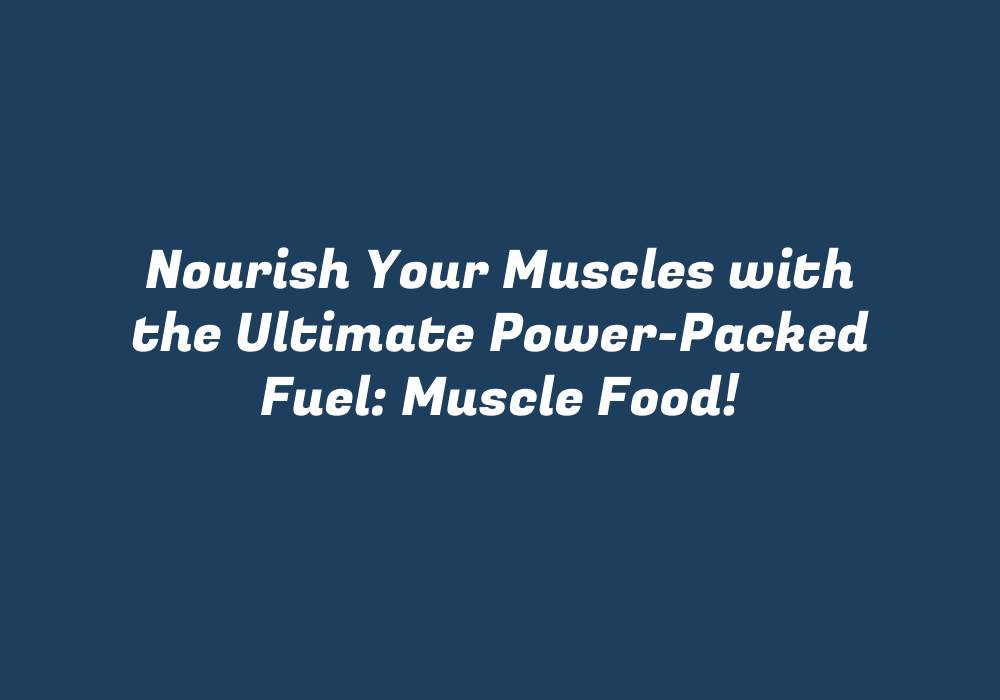Introduction to Muscle Food for Optimum Growth
Muscles are a vital part of our body as they facilitate movement, support joints, and contribute to overall strength. Ensuring that our muscles receive adequate nourishment is crucial for maintaining their optimal health and functioning. One way to do this is by consuming muscle food – a power-packed fuel specifically designed to enhance muscle growth and performance.
Understanding Muscle Food
Muscle food or muscle-building foods are nutritional elements that cater to the unique requirements of our muscles. These components promote growth by providing essential amino acids, carbohydrates, proteins, and fats necessary for energy production, tissue repair, and development. This blend of nutrients helps increase muscle mass, improve athletic performance, boost metabolism, and contribute to overall well-being.
Top Muscle Foods
Eggs: Eggs are a rich source of proteins that contain all essential amino acids required for muscle growth. They also provide vitamin D, which plays a significant role in calcium absorption for bone health. Eating eggs regularly helps to increase muscle mass and strength.
Greek Yogurt: This high-protein food contains essential amino acids needed for muscle growth, making it an excellent addition to your diet. Additionally, Greek yogurt is a source of calcium and vitamins B6 and B12, which contribute to energy production and muscle cell function.
Salmon: Salmon is rich in omega-3 fatty acids, which promote heart health and help reduce inflammation. Its high-quality protein content, vitamin D, and low-fat content make it an ideal choice for individuals looking to improve their overall fitness.
Lean Beef: Beef contains all essential amino acids that muscles need for growth. It is also a good source of creatine – a compound that plays a significant role in energy supply during high-intensity exercise, thereby helping to increase muscle mass and power output.
Quinoa: Quinoa contains all nine essential amino acids, making it an excellent vegetarian protein source. It also has a low glycemic index, which helps control blood sugar levels and supports fat loss while maintaining muscle mass. Moreover, quinoa is packed with fiber, magnesium, potassium, iron, zinc, and vitamins B1 and B6.
Almonds: These nuts are rich in unsaturated fats, vitamin E, and antioxidants. Almonds provide energy for workouts while also reducing muscle damage from exercise-induced free radicals. They also supply a good amount of protein and fiber to keep you feeling full longer.
Bananas: Bananas are an excellent source of carbohydrates, which provide fuel for muscles during workouts. Additionally, they contain potassium, magnesium, and vitamin B6, all of which play vital roles in muscle contraction, nerve function, and electrolyte balance.
Incorporating Muscle Foods into Your Diet
To incorporate these nutrient-dense foods into your diet, try following these tips:
- Include eggs as part of breakfast – scramble them, make an omelet, or use them to create a protein-packed sandwich.
- Substitute regular yogurt with Greek yogurt for snacks and smoothies. Add berries and a bit of honey for extra flavor.
- Prepare a lean beef stir-fry, incorporating lots of vegetables to provide essential micronutrients as well.
- Replace regular pasta with quinoa or other whole grain alternatives. Mix in chopped almonds and spinach for added protein and nutrients.
- Snack on a small portion of almonds during the day to get your healthy fat intake. Pair them with an apple or banana for a well-balanced snack.
Conclusion
Incorporating muscle foods into your diet is essential for nourishing and growing your muscles effectively. By understanding the benefits of these power-packed options, you can tailor your food choices to maximize muscle growth while supporting overall health and wellness.
Further Reading
For more information on how specific nutrients contribute to muscle growth, check out the following articles:
